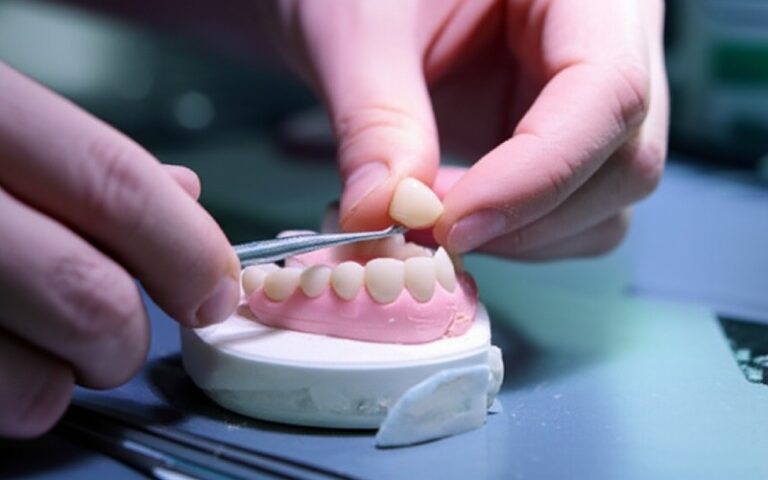
Saving Your Natural Smile: The Importance of Root Canal Treatment
For years, root canal has had a bad reputation. People think of pain and discomfort. But this is a misconception. This article will show you the truth about modern root canal therapy. It’s not the enemy. In fact, it’s often the hero that saves your tooth from being pulled.
This article is for you if you’re experiencing tooth pain or if your dentist has recommended a root canal. We will walk through what this treatment is, why it’s so important, and how it can save your smile for a lifetime. Reading this will help you feel calm and confident about this highly effective dental treatment. You will get a better understanding of why a root canal is a good thing for your oral health.
Inhaltsübersicht
What Is a Root Canal Procedure and Why Is It So Important?
Let’s start with the basics. What is a root canal? Think of your tooth. On the outside, you have the hard enamel. But deep inside, there is a soft center called the pulp. This pulp contains blood vessels and the tooth’s nerve. When deep decay or trauma damages a tooth, bacteria can get inside and infect this pulp. An infected pulp can be very painful and lead to serious problems. The importance of treating this can’t be overstated.
A root canal is a special dental treatment designed to fix this problem. It is a type of endodontic treatment, which is a field of dentistry focused on the inside of the tooth. During a root canal procedure, the dentist or an endodontist carefully removes the damaged pulp. They then clean and disinfect the area inside the tooth. Finally, they seal it to prevent another infection. This treatment saves your natural tooth and gives you relief from toothache. It is an essential procedure for maintaining your oral health.
How Do I Know If I Need This Endodontic Treatment?
You might be wondering, “How do I know if I need a root canal?” There are several signs that point to a possible infection in your tooth’s pulp. The most common symptom is a strong, constant tooth pain. This pain might get worse when you bite down or eat something hot or cold. You may also notice that your gums are swollen and tender near the problem tooth.
Sometimes, the tooth itself might look darker than your other teeth. This is a sign that the tissue inside has been damaged. In other cases, you might not feel much pain at all, but a dental x-ray during a check-up can show the infection. If you have any of these symptoms, it’s crucial to visit your dentist. A thorough examination will show if a root canal treatment is the right treatment for you. Don’t wait for the pain to get worse; immediate dental care can save your tooth.

Is Root Canal Therapy Really as Painful as People Say?
The idea that a root canal is a painful procedure is old news. Thanks to modern techniques and anesthesia, a root canal should feel no different than getting a simple filling. The pain people often talk about is the pain from the infection vor the treatment, not the treatment itself. The root canal is what stops the pain.
Your dentist will make sure the tooth and the area around it are completely numb before the procedure begins. You should not feel any pain during the treatment. The goal of this endodontic treatment is to remove the source of your discomfort. Many patients feel so much better right after the appointment. A root canal is a painless way to solve a painful problem and improve your health.
What Happens During the Root Canal Treatment?
The root canal procedure is very precise and effective. First, your dentist will take an x-ray to see the shape of your root canals and check for infection. Then, they will use local anesthesia to numb the tooth. A small sheet of rubber is placed around the tooth to keep it dry and clean during the treatment. The dentist then makes a tiny opening in the top of the tooth to access the infected pulp.
Using small tools, the dentist will carefully remove the damaged pulp, nerve tissue, and bacteria from inside the tooth. They will then clean the space thoroughly to disinfect the area. Once the inside of the tooth is clean, it is filled and sealed with a rubber-like, biocompatible material called gutta-percha. Often, a temporary filling is placed on top. This whole root canal therapy can often be completed in one or two appointments.
Why is Saving the Natural Tooth a Better Choice than Extraction?
When you have a badly infected tooth, you might think pulling it is the easiest option. While extraction is sometimes necessary, saving the natural tooth is almost always the better choice. Your natural teeth are stronger and work better for chewing than any replacement. Keeping your tooth helps maintain the natural alignment of your jaw and your smile.
If you have a tooth pulled, the gap left behind can cause other teeth to shift. This can affect your bite and make it harder to chew. To fix this, you would need more costly and complex dental work, like Zahnimplantate or bridges. A root canal treatment saves your natural tooth, which is a simpler and often better long-term solution. The goal of modern dentistry is to preserve your teeth whenever possible, and a root canal allows us to do that.
What are the Main Benefits of Root Canal Endodontics?
The benefits of root canal treatment go far beyond just stopping pain. The number one benefit is saving your natural tooth. This allows you to maintain your natural smile and continue eating the foods you love without any trouble. A successful root canal treatment lets you keep your tooth for a lifetime with proper care. It’s a highly effective way to deal with a deep infection.
This treatment also protects your other teeth. An untreated infection can spread from the tooth’s pulp to the bone around it. This can cause an abscess and damage the roots of nearby teeth. By getting a root canal, you prevent the infection from spreading. This helps you maintain good oral health. The procedure is efficient, painless, and helps you avoid the need for more complex dental procedures down the road.

How Do I Find a Skilled Dentist for My Root Canal?
Finding the right person for your root canal treatment is essential. While many general dentists perform root canals, some cases are more complex. For those, your dentist might refer you to an endodontist. An endodontist is a dentist who has completed extra years of training specifically in endodontics. They are experts at diagnosing tooth pain and performing root canal therapy.
When looking for a skilled professional, ask friends for recommendations or check online reviews. You can also ask your dentist about their experience with this specific procedure. Don’t be afraid to ask how many root canal treatments they perform. A good dentist or endodontist will be happy to answer your questions and make you feel comfortable. A confident patient is more relaxed, which helps make the treatment a success. Your dental insurance may also have a list of recommended specialists.
What Can I Expect During Recovery After the Treatment?
After your root canal appointment, your tooth may feel a little sensitive for a few days. This is normal, as the tissue around the tooth needs time to heal. Any discomfort is usually mild and can be managed with over-the-counter pain medicine. Your dentist will give you specific instructions to follow. It’s best to avoid chewing on the treated tooth until it is fully restored.
Most people can return to their normal activities the very next day. The recovery is usually quick and simple. The temporary filling will protect the tooth until your next visit. It is crucial to schedule your followup appointment to have a permanent Krone or filling placed. This final step is what protects the tooth from future damage and ensures its long-term health.
How Can I Ensure the Long-Term Success of My Root Canal?
A tooth that has had a root canal can last a lifetime. However, its long-term success depends on two things: the quality of the root canal treatment and your care afterward. The procedure itself needs to be done well. The inside of the tooth must be completely clean before it is sealed. This is why seeing a skilled dentist or endodontist is so important.
After the root canal is done, you must have a permanent restoration, like a crown or filling, placed on the tooth. A tooth after a root canal is more brittle and can break if not protected. A crown gives it the strength it needs. Good oral hygiene is also crucial. You still need to brush and floss the treated tooth just like your other teeth to prevent new decay or gum problems. Regular dental visits are essential to make sure the teeth remain healthy.
Why is Post-Treatment Care Crucial for My Oral Health?
Post-treatment care is not just a suggestion; it is a critical part of the entire treatment plan. The root canal procedure cleans the infection from inside the tooth, but the tooth itself is not yet fully repaired. Think of the root canal as building the foundation for a house. The crown is the strong roof that protects everything inside. Without that final step, the tooth is at risk of fracture or a new infection.
Following your dentist’s instructions after the treatment is key to maintaining good oral health. This includes making and keeping your followup appointment for the final crown. It also means committing to good oral hygiene at home. Your treated tooth no longer has a nerve, so it won’t feel pain from tooth decay. This makes regular dental check-ups even more important, so your dentist can spot any issues early. Proper care will help you preserve your smile and health for years.








